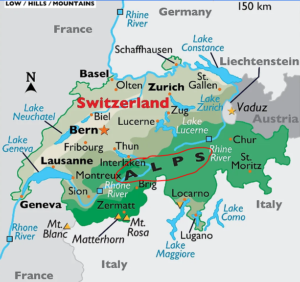In news
According to a recent study, climate change has dramatically altered the Swiss Alp landscape where melting glaciers have created over 1000 lakes.
Key highlights of the study
- The study was published by the Swiss Federal Institute of Aquatic Science and Technology (Eawag).
- The inventory of Swiss Glacial lakes showed that almost 1,200 new lakes have formed in formerly glaciated regions of the Swiss Alps since the end of the Little Ice Age around 1850.
- Many of those lakes still exist today.
- As per the study, the marked acceleration in formation was also surprising, pointing out that 180 have been added in the last decade alone.
- It says that glaciers in the Swiss Alps are in steady decline, losing a full 2% of their volume last year alone.
- According to a 2019 study by the ETH technical university, even if the world were to fully implement the 2015 Paris Agreement two-thirds of the Alpine glaciers will likely be lost.
- There was an initial peak in glacial lake formation in the Swiss Alps between 1946 and 1973, when nearly eight new lakes appeared on average each year.
- After a brief decline, the lake formation rate surged between 2006 and 2016, with 18 new lakes appearing each year on average, while the water surface swelled by over 400 square metres (4,300 square feet) annually.
About Swiss Alps
- The Alpine region of Switzerland, conventionally referred to as the Swiss Alps.
- They are situated south of the Swiss Plateau and north of the national border.
- The Swiss Alps extend over both the Western Alps and the Eastern Alps, encompassing an area sometimes called Central Alps.

- While the northern ranges from the Bernese Alps to the Appenzell Alps are entirely in Switzerland, the southern ranges from the Mont Blanc massif to the Bernina massif are shared with other countries such as France, Italy, Austria and Liechtenstein.
Swiss Federal Institute of Aquatic Science and Technology(Eawag)
- It is a Swiss water research institute and an internationally networked institution.
- As part of the Swiss Federal Institutes of Technology Domain, it is an institution of the Federal Department of Home Affairs of the Swiss Confederation.
- The Eawag is based in Dübendorf near Zurich and Kastanienbaum near Lucerne
















